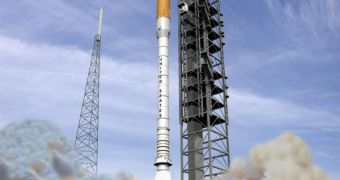For the first time in more than two decades, NASA is working on a new class of rockets, the ARES range, a part of Project Constellation. Scheduled to replace the aging shuttle fleet by 2015, the Project has been plagued with controversies ever since it was first accepted, and all of its components have been openly criticized or acclaimed. Now, the White House-appointed presidential review panel that has been checking out NASA's plans and progress over the past couple of months says that the timeline the agency has in store for retiring the shuttles and bringing Constellation online is unfeasible.
The panel members believe that, by retiring the shuttles at the end of the next year, the United States will be left without capabilities to deliver humans to orbit for the first time in the history of its space program. According to initial proposals, Project Constellation was to be completed by 2015. In fact, only two of its components, the ARES I delivery system and the Orion Crew Exploration Vehicle, were scheduled for completion, with the ARES V heavy-lift rocket and the Altair Lunar Lander envisioned to become operational later on. By 2020, NASA planned, US astronauts would have been back on the Moon.
The conclusions of the panel investigation revealed that ARES I and Orion would most likely not be ready to fly manned missions to the International Space Station (ISS) by March 2015, as NASA claims. If the deadline is not respected, then many jobs will be lost at the Kennedy Space Center (KSC), in Cape Canaveral, Florida, where the shuttle launch pads are. Additionally, the panel revealed, the total costs of Project Constellation were unknown. Development stages for the new technologies that will fly on the Project's components have already driven costs overboard, and NASA admitted that, under its current, four-year funding plan, it fell about $3 billion short to completing ARES I and Orion on time.
While the report admits that the agency made substantial progress in its effort, NASA “will not be able to reliably estimate the time and money needed to execute the program.” The authors of the report believe that only after the major technical issues are overcome will the agency be able to give an accurate timeline and cost schedule for the Project. However, the issues “are not likely to be overcome in time to meet the 2015 date,” the report adds, quoted by Space.

 14 DAY TRIAL //
14 DAY TRIAL //